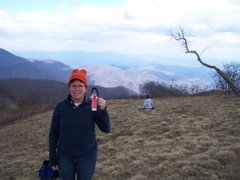TTEC-Spring Mid-Atlantic Workshop
Post by Sharon Steger, Middletown High School, Middletown, MD
Our first workshop
was held at the Kirkridge Retreat Center. We had the pleasure of meeting many
great people including Ms. Karen Lutz, Director of the Mid-Atlantic Region
Appalachian Trail Conservancy, as well as a thru-hiker! I was first introduced
to the ATC and later in July discovered that there is an ATC close to
Middletown High, located in Harpers Ferry!
I was about to discover that Karen
would be my hiking coach every step of the Trail. I very quickly learned that
Myron Avery built the AT and Benton MacKaye created the vision for the AT. I learned
that the Trail includes 14 states, Georgia through Maine. I am a Service
Learning Fellow and was interested in finding new ways to have my students
participate in outdoor activities.  The 6 principles of place-based service
learning include: a. grounded in place b. real, c. empowering, d.
collaborative, e. integrated, f. rigorous. Being a Biology instructor, studying
concepts like endangered species, water quality, or exotic invasive plants seemed
like a perfect fit! TTEC is about increasing civic responsibility, increasing
volunteerism, and increasing environmental stewardship. If students help to
keep the trail free of exotic invasive plants the students will then have
ownership of that section of the trail. At this workshop I was reminded to “do
what is important, not urgent.” It was also stressed that when asked what we
teach, that we respond first by saying “kids”, and our specific curriculum
second. If we expect students to get excited we as teachers must be passionate!
With our enthusiasm we can make our students, administration, Board of Ed., and
community “look good.” The following web site is a nice introduction for an
introduction to “Leave No Trace.”
The 6 principles of place-based service
learning include: a. grounded in place b. real, c. empowering, d.
collaborative, e. integrated, f. rigorous. Being a Biology instructor, studying
concepts like endangered species, water quality, or exotic invasive plants seemed
like a perfect fit! TTEC is about increasing civic responsibility, increasing
volunteerism, and increasing environmental stewardship. If students help to
keep the trail free of exotic invasive plants the students will then have
ownership of that section of the trail. At this workshop I was reminded to “do
what is important, not urgent.” It was also stressed that when asked what we
teach, that we respond first by saying “kids”, and our specific curriculum
second. If we expect students to get excited we as teachers must be passionate!
With our enthusiasm we can make our students, administration, Board of Ed., and
community “look good.” The following web site is a nice introduction for an
introduction to “Leave No Trace.” Marian Orlousky, ATC, introduced us to Phenology Monitoring on the Appalachian Trail. Phenology is
the study of the timing of recurring plant and animal life cycle stages
(hibernation, bud breaking or flowering, animal migrations, insect emergence).
Monitoring phenology helps us understand how plants, animals and systems
respond to environmental variation and changing climates. The goal of this
program is to establish sites along the AT where citizen scientists can go to
monitor specific plant species. “Nature’s Notebook is a great way to involve
students as well as the community.
Marian Orlousky, ATC, introduced us to Phenology Monitoring on the Appalachian Trail. Phenology is
the study of the timing of recurring plant and animal life cycle stages
(hibernation, bud breaking or flowering, animal migrations, insect emergence).
Monitoring phenology helps us understand how plants, animals and systems
respond to environmental variation and changing climates. The goal of this
program is to establish sites along the AT where citizen scientists can go to
monitor specific plant species. “Nature’s Notebook is a great way to involve
students as well as the community.
www.earthzine.org
gives instructions for making phenology wheels. In the evening we had the
opportunity to make “bare books” into very cool journals. The next morning we were shown what to wear and what to bring
on our first hike for TTEC.





No comments:
Post a Comment